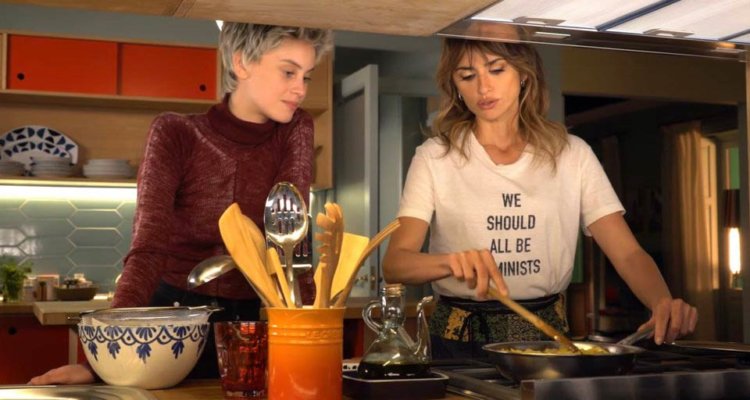After 22 films Almodovar, the Spanish film great, has made a film in which a major theme is the Spanish Civil War, specifically the finding and excavating of the hidden graves of 100,000 victims of the Francoists.
For me this is his best, and a truly great film.
Every element is interrelated, film students will be dissecting it for years.
The story is of Janis, a photographer in Madrid, a stunning performance by Penelope Cruz, who is campaigning for the digging up of an area of her local village, where it is known that her great grandfather is one of those buried by falangists (=Spanish fascist party founded in 1930s, only legal party allowed under Francoism).
In 1977, 2 years after Franco’s death, a government was elected that enacted a ‘Pact of Oblivion’ that said that there should be no more talk of the Civil War, basically to avoid conflict. Obviously there was a lot of opposition to this and a law was finally introduced to find the graves, but little finance came so it hardly happened. Janis was trying to help organise one of the few successful groups.
After all this time Almodovar says this is the first Spanish film to deal with the subject.
Janis enters into a relationship with one of the archaeologists involved in working on graves and she becomes pregnant by him. For the rest of the film he is away. Through the film we wait to see if they get permission for the dig.
When Janis goes in to hospital to have the baby she shares the room with a very young rape victim called Ana. She is amazingly played by Milena Smit.
So here we have two themes. Firstly single mothers, as the wives of the Civil War victims became. Secondly there is a young woman who is apolitical, through ignorance, whom Janis has to teach. Ana’s mother obviously has kept her ignorant. She claims to not being interested in politics, whilst achieving fame in plays by Lorca, a famous Spanish writer and one of the disappeared.
Both babies have problems at first and are taken away, for a short while, in the hospital.
The women develop a bond, and pledge to keep in touch. Ana is at home trying to look after the baby alone, whereas Janis goes to work leaving the maid and a babysitter to take care of things.
I will not spoil the film by giving too much away but there is a lot about identity that relates back to the issue of the disappeared.

Ana and Janis’s lives continue to intersect and Ana lives with Janis for a period. Janis keeps a great secret that shows how easy it is to conceal and rationalise.
Finally the village is granted the right to have the dig. The film shows the trip to the village to gain any knowledge that the villagers still hold. We hear about the old woman whose father was holding her as a baby when he was taken away and took her rattle. Then the granddaughter whose mother told her he took nothing, but always wore a wedding ring. The archaeologists want to be certain. These scenes are really moving. Throughout, family and mothers are the dominant theme.
Almodovar says that people do not want revenge they want a place to put flowers. But even this is a sort of revenge in that it tells the truth of real people and is in complete contradiction to what the far right want.
We then move to the dig, one of movie’s great scenes when the villagers arrive. For me this reminds me of the Last Supper scene in Bunuel’s Viridiana, a devastating attack on the Catholic Church, but this is an attack on the political denials and cover-ups of Spanish politicians of all varieties.
This scene is so well built up to that both my companion and I were close to tears.
Ken Loach’s Land and Freedom, on the Spanish Civil War went down really well in Spain, because nobody at the time was doing that sort of film. I feel that this will probably have more effect because of the rise of neo-fascists (Vox party) who try to glorify this political past. As Almodovar says, Vox is the third biggest voice in Parliament, so this is the right time for the film.
But for me this has a wider impact, it speaks to all those who have been denied justice in ‘Peace and Reconciliation’ Agreements, that have meant that political statements have been made, but as in South Africa the same people control the economy. This is also the case in Ireland regarding actions of the British State. All over Africa the relatives of victims need to have justice. Similarly in Latin America through the Chilean dictatorship, the Brazilian Junta, the Argentine junta, all those victims will connect with this.
The film ends with a quote saying history will not hide, more films like this will help history. It also helps that Almodovar is doing interviews everywhere, telling it like it is e.g. on the Graham Norton show last week.
The film contains all of this director’s normal skills, great credits, terrific interiors and emotions portrayed brilliantly.
Art Book Review Books Campism Capitalism China Climate Emergency Conservative Government Conservative Party COVID-19 Creeping Fascism Economics EcoSocialism Elections Europe Far-Right Fascism Film Film Review Fourth International France Gaza History Imperialism Iran Israel Italy Keir Starmer Labour Party Long Read Marxism Marxist Theory Migrants Palestine pandemic Police Protest Russia Solidarity Statement Trade Unionism Trans*Mission Ukraine United States of America War

